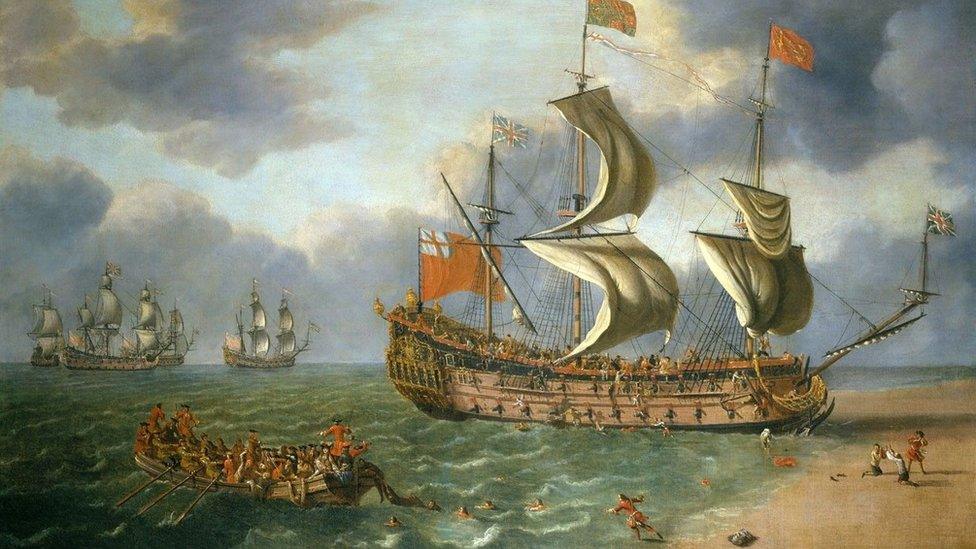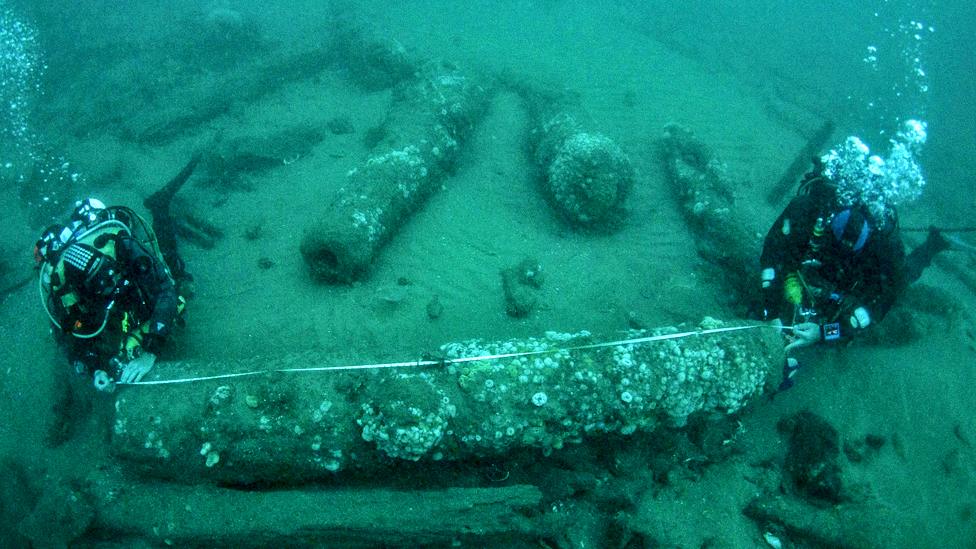Gloucester: Research finds disease, hunger & infighting
- Published

Johan Danckerts painted the Gloucester running aground on a sandbank off Great Yarmouth, while on its way to Scotland
New research into a warship that sank off Norfolk has revealed stories of hunger, disease and infighting.
University of East Anglia (UEA) historians have been examining the Gloucester after the discovery of the wreck, off Great Yarmouth, was made public last year.
The ship ran aground in 1682, nearly killing the future King James II.
Researchers say a previous captain was removed after a dispute about the boat's role in the Caribbean.
The Gloucester, which remains on the seabed, is considered the most important maritime find since the Mary Rose.
She sank after running aground on a sandbank killing hundreds on board, although the Duke of York, who became James II of England, managed to escape.
Based on newly analysed documents, including diaries, letters and wills, researchers at the UEA have looked at the ship's role in Oliver Cromwell's troubled campaign, known as "the Western Design", which aimed to oust the Spanish from the Caribbean in the mid-1650s and incorporate captured territory into the British Empire.
"The Gloucester is a really significant warship to national and global history," said Dr Benjamin Redding, senior research associate on the Gloucester Project.
"It participates in many major battles. Before this point, navies are largely used to land forces. But by now, navies are being used in big sea battles and that's exactly what the Gloucester does."

Dr Benjamin Redding says conditions "really were quite dire" for sailors on the Gloucester
Dr Redding's new research uncovered a deadly outbreak of disease on board, thought to have been yellow fever.
There were also reports of infighting between the ship's captain Benjamin Blake and the commander of the fleet William Goodsonn.
"Benjamin Blake is really unhappy with the situation in the Caribbean. He doesn't believe the Navy's being used properly," said Dr Redding.
"He believes his men are sitting there bored, and he's just watching them get sick and die.
"According to Goodsonn's own words, Blake was attempting to raise men against him, that there was going to be some sort of formal mutiny.
"Goodsonn ends up removing Benjamin Blake from his service."
At the time of the sinking, the captain of the Gloucester was Sir John Berry.

The Gloucester was discovered by divers in 2007
Dr Redding's new research is being published in The Historical Journal, external.
Prof Claire Jowitt, director of the Gloucester Project, said: "Every chapter of the history of this warship reveals how central naval history is to Britain's island story.
"The project aims to change popular understanding to show the ways 17th Century politics and religion were indelibly intertwined with the nation's maritime history."
The Gloucester was discovered by divers in 2007. But details of the find were only made public last year due to security reasons.
A major exhibition, external about the ship's history is being held at Norwich Castle Museum, running until 10 September.

Follow East of England news on Facebook, external, Instagram, external and Twitter, external. Got a story? Email eastofenglandnews@bbc.co.uk, external or WhatsApp us on 0800 169 1830
- Published11 June 2022

- Published16 February 2023
